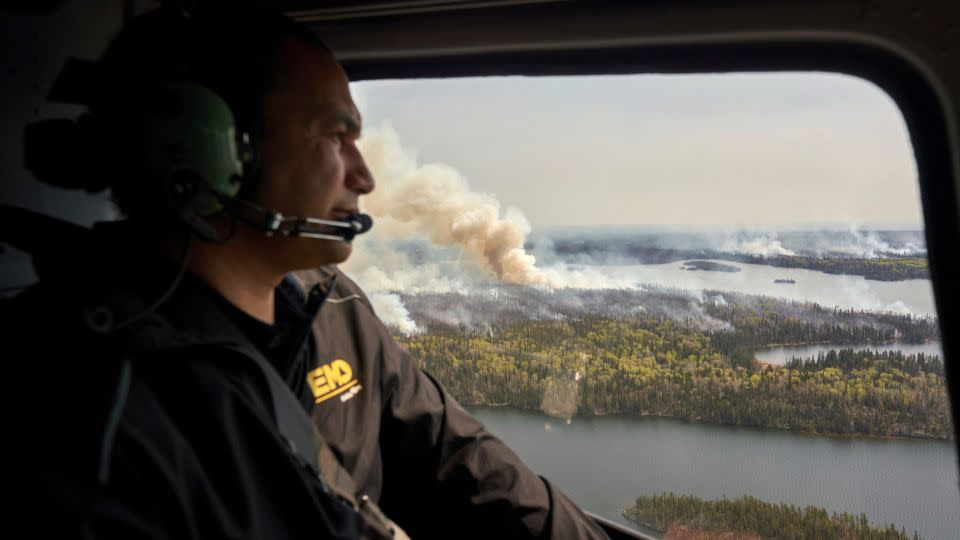Editor’s Note: Pamela Appea is a New York City-based journalist covering health, science and intersectionality. The views expressed here are her own. Read more opinion at CNN
Asthma took my mother’s life and has sickened each of my two children at different times in their lives. During a relatively short period of my life, I also became ill with it a few years ago. I’m doing better now, but I’m left with the fear that asthma could always return, turning my family’s life upside down, sending us running to the emergency room in the middle of the night, or causing my children to have another having to miss a school day.

I worry about asthma in the winter, when the frigid, dry air can lead to constricted, irritated airways, making each breath difficult to take. I worry about it in the spring, when the pollen in the air can cause wheezing, coughing and shortness of breath. I worry about it in the fall because my lungs haven’t quite adjusted to the increasing cold and when ragweed pollen fills the air.
But these days my fears about asthma tend to center around the summer months.
Last year, waves of thick black smoke poured from raging wildfires in Canada, blackening the skies of the northern plains of the US and polluting the air as far away as New York City, where I live. Those blankets of smog settled over much of the US, descending on communities as far away as Florida. Some of the smoke even found its way to Europe. My family endured the worst indoor smog and luckily none of us got sick.
Now we may be on the verge of a repeat of last summer — and families like mine with a history of asthma are bracing themselves again. Crippling heat and devastating wildfires are back in Canada. Last month, fires across the border in Canada led to the evacuation of hundreds of people. Minnesota and Wisconsin warned last month that people should stay indoors.
That was mid-May, when it was still spring. I shudder to think of what August will bring. Research has shown that wildfire smoke may be linked to the onset of asthma. According to the Centers for Disease Control and Prevention, there are approximately 25 million Americans with asthma, so I suspect many others are feeling the same sense of dread I am.
There is another connection between Canada, asthma and my family – and it is somewhat coincidental. My mother, an immigrant from Ghana, lived in Canada for many years, although she did not develop asthma until we moved to the United States.
Its circuitous path is not unknown to migrants from Africa to North America. After emigrating from Ghana, my mother spent a few years in England and then moved to Quebec, where she lived and worked. When she was divorced, she had to raise me, my older sister and two older brothers alone. Ultimately, she decided that New York City, with its wealthy immigrant community, including many people from the African diaspora, was a better place to raise her family than the remote village in rural Canada where we were among the only black people belonged.


But shortly after arriving in the United States, my mother developed adult-onset asthma. It could be caused by stress, environmental issues, genetics or a combination of factors, it’s impossible to say. When she started getting sick more often, I was about ten years old. But even at that young age, I quickly came to realize that asthma medications were unaffordable in the United States. The high price tag sometimes put the medications my mother so desperately needed out of reach.
After losing someone so close to me to asthma, I have become very familiar with the signs of the disease. Normally my mother wouldn’t admit to me and my three older siblings that she was feeling bad, but as a child I learned to read her symptoms. I remember the helplessness I felt during her asthma attacks as her wheezing got worse and worse.
I worried during the doctor’s appointments I sometimes went to with her, as she rattled off her list of ailments: chest tightness and not being able to take full breaths. After her labored breathing, my mother seemed exhausted and exhausted. I now understand that asthma episodes, especially undertreated ones, can cause significant stress on the body. I wonder if the damage caused by the cumulative effect of her asthmatic episodes killed her.
Unfortunately, the challenges my mother faced in obtaining asthma medication continued. Co-pays and uncovered prescription costs put a strain on our family’s budget. There were times when my mother would not fill her prescriptions for her asthma medications out of concern about the cost. Then, one evening, about thirty years ago, her asthma struck again. It was a particularly severe episode that left my mother so short of breath that she could not utter more than a few words at a time.
Before my mother could no longer speak at all that day, my mother asked me to call a family friend to take her to the hospital. She was concerned, as always, about money and how the cost of an ambulance would put further strain on our family finances. By the time we finally got to the emergency room, she was unconscious. A short time later she was gone. Asthma had claimed my mother when she was just 48 years old, in what should have been the prime of her life.
Dealing with the signs and symptoms after years of living with asthma – first as a child of someone with the condition, then as a mother of two children who developed severe asthma. I know that asthma has a genetic component. Research shows that if you have a parent with asthma, you have a 25% chance of developing asthma yourself.
I think about my mother trying to get off her meds. I don’t know what I would have done without access to a reliable supply of Albuterol, a home nebulizer, maintenance medications, and the guidance of medical professionals I respect and trust.
Yet I remain vigilant because there is no cure for asthma and my family is so susceptible to its ravages.
I keep a close eye on pollen counts and news reports about shortages of potentially life-saving medications my family needs to combat asthma.
I now also keep an eye on the weather, for predictions of fires a thousand miles away that could lead to another terrible episode of the disease that has already stolen so much from me.
For more CNN news and newsletters, create an account at CNN.com